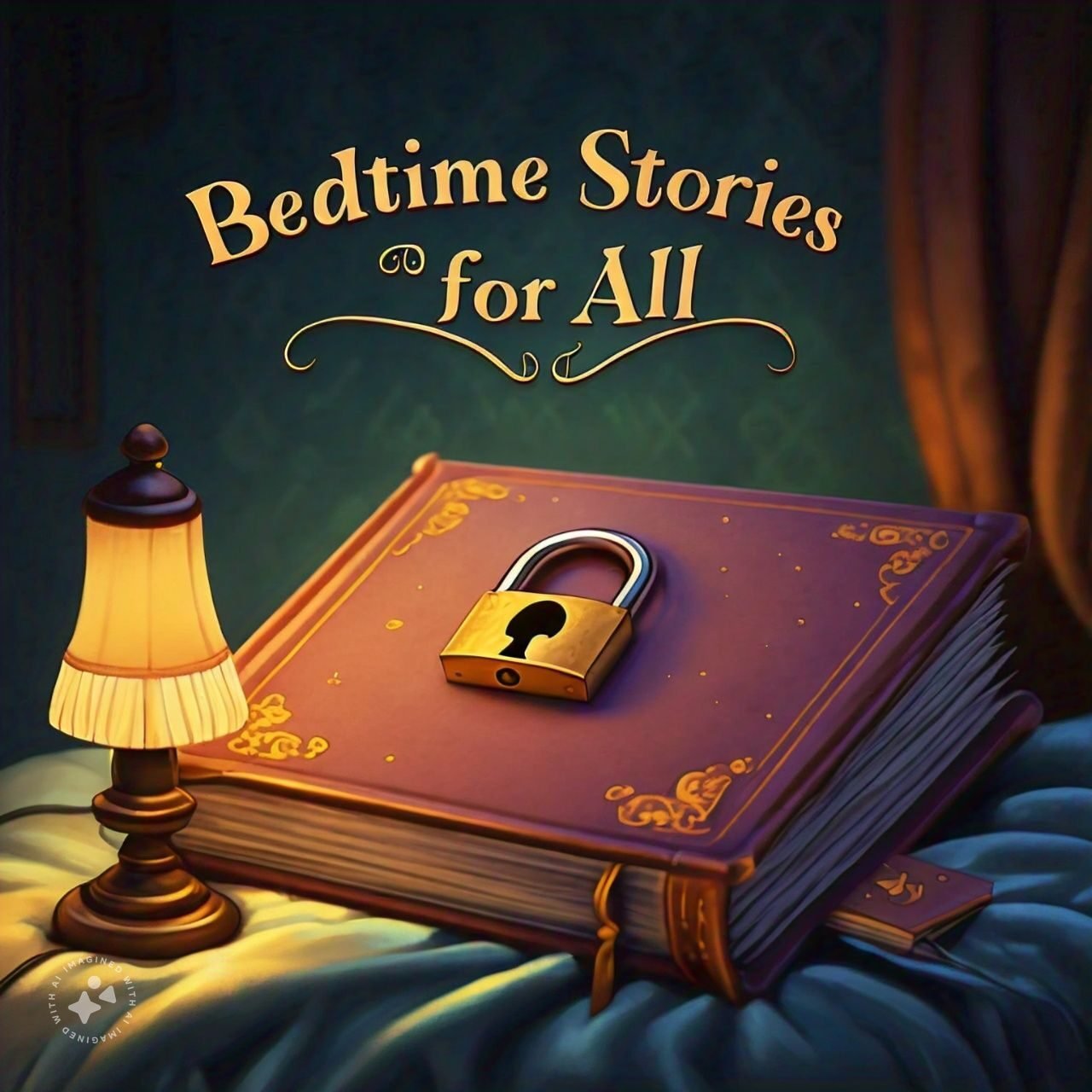After the Betal’s escape, King Vikramaditya, armed with his sword, proceeded to the peepal tree where Betal was hanging upside down on one of the branches. The determined king went near the tree, pulled the corpse onto his shoulders, and began walking towards the crematorium.
On the way, Betal said, “Vikram, you are indeed unparalleled when it comes to your robust determination. No king could ever match your focus and dedication towards fulfilling a task. Your reputation for making wise judgments prompts me to narrate another interesting story. But remember that you must not speak in between, or else I will be back on my tree.”
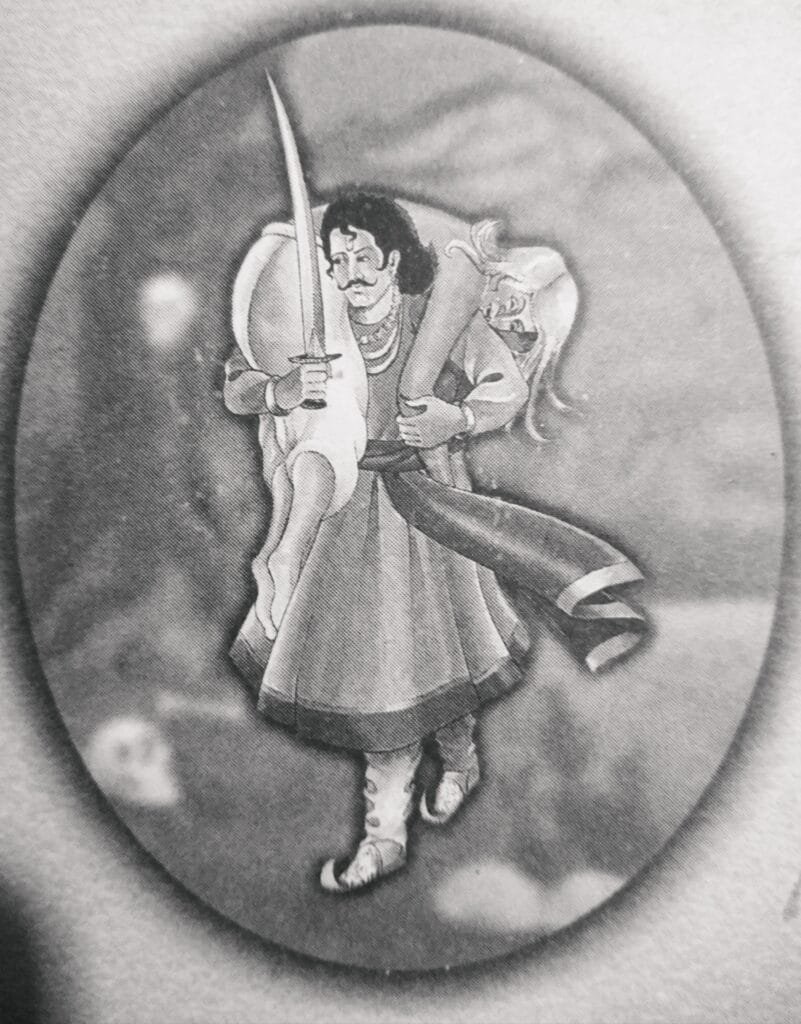
Betal began his tale:
During the Sangam Age in South India, the three most prominent, powerful, and prosperous Tamil kingdoms were the Cheras, Cholas, and Pandyas. The Chera dynasty was especially known for its maritime trade with the Romans and the export of spices, particularly black pepper. The Sangam Age was a period of flourishing Tamil literature, culture, and political institutions, named after the Sangam assemblies—gatherings of Tamil poets and scholars who composed classical Tamil literature.

In the Chera dynasty, a beautiful princess named Vanavan Maha Devi lived in the royal palace at Muziris, the Chera capital. One morning, while taking a walk in the royal garden on the outskirts of Vanji, she strolled through the lush greenery of grass and trees when she noticed a young man asleep in the cool shade of a tree. Princess Vanavan Maha Devi woke him and demanded, “Who are you? What are you doing in our royal garden? Do you not know that trespassing is a crime in this kingdom? Had the royal guards found you, they would have thrown you into jail!”
The young man said, “My apologies for my unintentional trespassing. My name is Parantaka Vira Narayan, and I am the king of the Pandya dynasty. After a full day of travel through the Palghat Pass en route to Madurai, I was extremely dehydrated and tired. Therefore, I decided to spend the night under this tree.”
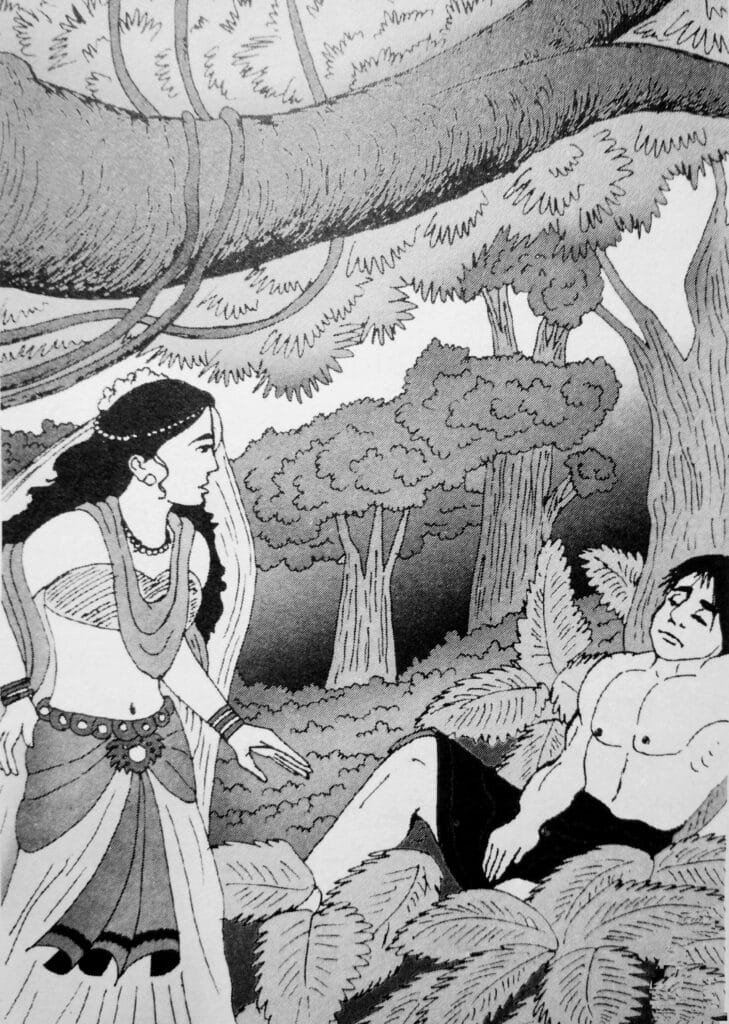
After exchanging a few more words, Chera Princess Vanavan Maha Devi instantly developed a deep fondness for him. Pandyan King Parantaka Vira Narayan, too, found himself drawn to her. Though their conversation was brief, the blossoming love between them was undeniable—both could feel it. Yet, knowing the Chera Princess was beyond his reach, the Pandyan King quietly slipped away from the garden.
After riding for hours, Parantaka Vira Narayan halted at a peaceful Gurukul nestled in the airy breeze of the jungle, its thatched huts harmoniously framed by lush greenery and ancient trees. As he dismounted to quench his thirst, the horse’s neigh drew the attention of an acharya, who emerged from his dwelling accompanied by a disciple—a former student returned after years in a distant kingdom. The acharya studied the weary king, his eyes kind but probing, and asked, “What brings you to our sanctuary, noble traveler?”

The Pandyan king swayed where he stood, the heat rising in visible waves from his cracked lips. “Guru ji,” he croaked, voice rough as a farmer’s hands. “Call me Parantaka—Vira Narayan if you’re feeling formal.” A dry chuckle. “Though right now, I’d trade my crown for a sip of anything that didn’t taste like dust and regret.” He squinted at the gurukul’s well, throat working. “Madurai can wait. Right now, even your meanest goat drinks better than a king.”
The acharya smiled, “O King, our ashram is open to all. Come, take some rest.”

Acharya Kanada’s lips curled into a knowing smile, his eyes crinkling like old parchment. “Kanada,” he said, as if the name itself carried the weight of a thousand debates. “Or Acharya Kanada, if you’re one of my pupils—though I suspect kings rarely are.” He gestured to the gurukul’s sun-baked courtyard, where a trio of parrots squabbled over spilled grain. “This humble place? It runs on the stubbornness of old men and the gold of three crowns—Pandya, Chera, and Chola. Even rivals agree on one thing: let the gurukuls eat.” A dry chuckle. “Funny, isn’t it? The swords clash, but the scribes never starve.”
Acharya Kanada’s eyes twinkled like a man holding a winning dice. “Fortune favors you, Raja,” he said, nodding toward the shaded veranda. “Aditya Chola himself is here—my old pupil, though he’s traded slates for scepters now.”

The Chola king emerged, his smile sharp as a new-minted coin. Greetings were exchanged—polite, practiced, the kind that hid daggers in dimples. “Madurai’s gardens are legend,” Aditya offered. “I’ll send my poets to describe them… unless you’d rather show me yourself?”
Parantaka’s laugh was smooth, but his fingers tightened around his cup. Invitations are traps wrapped in silk, he thought. The taste of well-water turned bitter on his tongue.

Chola King Aditya noticed his companion’s troubled expression. “What troubles you, friend? You seem lost in thought,” he inquired gently.
Parantaka Vira Narayan sighed deeply before recounting his encounter – how Chera Princess Vanavan Maha Devi had discovered him, their meaningful exchange, and the unexpected connection that had blossomed between them.

As the Pandya king finished his tale, Acharya Kanada’s eyes twinkled with knowing wisdom. “Fortune smiles upon you, King Parantaka,” he said. “This matter is not beyond resolution. I believe I may be able to assist you.”
Parantaka’s brow furrowed. “But how, Acharya ji? What can be done in such a delicate matter?”
Acharya Kanada reached into the folds of his simple woolen robe and produced a ring that seemed to catch all the flickering hut-lights at once. “Take this,” he said, pressing the cool metal into Parantaka’s palm. “Wear it and see for yourself.”

As the ring slid onto his finger, Parantaka gasped. A tingling sensation spread from his hand through his entire body. Before he could speak, his own voice startled him – it had risen in pitch. Looking down, he saw the familiar lines of his warrior’s hands softening, his royal robes now hanging differently on his frame.
“A…a woman?” he stammered, touching his suddenly smooth face. The reflection in a nearby water jar showed a beautiful stranger staring back.
A smile played at the corners of the acharya’s mouth. “While this ring graces your finger, your form will become that of a beautiful woman. Remove it,” he tapped Parantaka’s palm for emphasis, “and your true self returns as easily as waking from a dream.”

Parantaka turned the ring on his finger, watching sunlight dance across its strange carvings. “But Acharya-ji,” he murmured, his new feminine voice still foreign to his ears, “how will this form help me approach Princess Vanavan? Won’t the Cheras recognize the king beneath… this?” He gestured at his silk-clad form.
Acharya Kanada adjusted the travel bundle on his shoulder, his eyes crinkling like old parchment in sunlight. “When an old teacher brings his daughter to court, who looks for conspiracies?” He chuckled. “I’ll tell them my daughter Gargi needs shelter while I pilgrimage to Uraiyur. The Cheras honor Brahmin guests – they’ll welcome you without question.”
Aditya Chola barked a laugh, slapping his thigh. “By Shiva’s locks! The scholar plays spy better than my best scouts.” He leaned in, whispering to Parantaka’s disguised ear: “Just don’t fall in love with your own reflection, Pandya.”

At dawn, their paths diverged – Aditya’s chariot kicking up dust toward Thanjavur, while Acharya’s bullock cart creaked northward. Inside, “Gargi” adjusted her veil, its border embroidered with lotus flowers that matched her nervous heartbeat. The ring’s magic pulsed warm against her – his – skin as Vanji’s gates loomed ahead.
The Chera court at Vanji welcomed Acharya Kanada with the reverence due to a scholar of his stature. Incense curled around the carved pillars as the Chera king rose from his pearl-inlaid throne, his gold armbands glinting in the afternoon light. “Acharya-ji,” he boomed, “what brings wisdom itself to our humble court?” The aging scholar bowed, his white beard brushing the polished floor. Beside him, his “daughter” Gargi kept her eyes demurely lowered, though the set of her shoulders betrayed a tension unbefitting a simple Brahmin girl.

Acharya’s voice quavered with perfect theatrical frailty. “O King, this old man seeks your mercy. I must make pilgrimage to Uraiyur, but my daughter…” He gestured weakly to Gargi, whose hennaed fingers now twisted nervously in her sari’s edge. “Who will protect her while I walk the path of the gods?” The Chera king’s face softened. He had daughters of his own. “Peace, learned one. She shall reside in our women’s quarters as companion to Princess Vanavan.” The king failed to notice how Gargi’s breath hitched at the princess’s name, or how her bare toes curled against the cool stone floor.
Princess Vanavan’s chamber smelled of sandalwood and the faint citrus of nimbu water. When the last servant had withdrawn, Gargi stood frozen near the latticed window. Moonlight caught the strange ring on her finger as she turned it once, twice—then pulled. The transformation came like a sigh: shoulders broadening, jaw squaring, the delicate sari suddenly straining across a warrior’s frame.
Vanavan’s silver cup clattered to the floor. “You!” she breathed, not in alarm but in dawning delight. The Pandyan king ran a self-conscious hand through hair still scented with jasmine oil. “My princess,” he murmured, “forgive my deception. Though if you’d seen me try to walk in these bangles, you’d know my punishment began days ago.”
Vanavan’s laughter rang like temple bells as she stepped closer, her curiosity outweighing any proper outrage. Outside, a night heron called across the palace ponds, bearing witness to secrets it would never tell.

The adviser had been watching for days. Each morning, as “Gargi” emerged from Princess Vanavan’s chambers with her pallu slightly disheveled and the scent of night-blooming parijata clinging to her braid, his obsession grew. When he finally knelt before the Chera king, his voice trembled like a bowstring pulled too tight. “Maharaja, I would trade my ancestral lands for that Brahmin girl’s hand.”
The summons came at midday. Parantaka—still draped in Gargi’s lavender pattu saree—felt the ring burn against his skin as he entered the king’s chamber. Sunlight through the jali windows striped the adviser’s eager face like a caged tiger’s.

“Consider me your father today,” the Chera king said. “This adviser of mine has done a great service to this kingdom and now wants to settle down in his life. He claims his heart stops each time you adjust your pallu. He wants to marry you.”
Through Gargi’s lowered lashes, he saw the adviser’s eager fingers tapping against his jeweled girdle—each click of a gemstone on metal counting the seconds until his reply.
“A daughter’s heart overflows at your kindness, pitah.” His voice was honey-steeped, though his toes curled inside Gargi’s silver anklets. “But would my lords deny an old scholar the joy of giving his child away?” He pressed his palms together, the magical ring biting into his skin. “When Acharya-ji returns from Uraiyur with Kaveri’s waters for my wedding bath…” A deliberate pause, “then let this unworthy one serve your noble house.”
The Chera king’s approving nod sent his pearl earrings swaying. “Wisely spoken, girl.” He missed how “Gargi’s” borrowed bangles clashed like warning bells as she poured his fruit juice—nor did he notice the princess’s nagini bracelet left carelessly on “her” wrist.
The adviser, drunk on imagined wedding nights, bowed deeply. “I’ll compose a thousand pasurams in your praise while I wait, devi.”
Only the parrots in the courtyard heard Parantaka’s gritted teeth as he smiled.

The palace corridors seemed to narrow around Parantaka as he hurried away from the king’s chambers, the weight of Gargi’s borrowed bangles suddenly unbearable against his wrists. Rather than turning toward Princess Vanavan’s quarters, he slipped through the servants’ passage, where the air hung thick with turmeric and tamarind—spices that clung to his silks like accusing fingers. By the time he reached the forest’s edge, the moon had risen, casting long shadows from the aal trees whose crimson sap stained his pallu like bloodstains. With trembling hands, he wrenched the ring from his finger, gasping as his body reclaimed its true form: shoulders broadening, the delicate silver anklets now cutting into masculine ankles, the sweet floral oils in his hair clashing with the sweat of fear.

His stallion recognized him before he’d fully transformed, snorting impatiently where it was tethered beneath a banyan tree. Parantaka mounted bareback, his royal training the only thing preventing him from digging his heels into the beast’s sides like a common bandit. The Gurukul’s firelight winked through the trees hours later, guiding him to where Acharya Kanada sat grinding neem leaves for his evening poultice. The old scholar didn’t look up as the Pandyan king collapsed onto the veranda, his breath coming in ragged gulps. “They want to marry her—marry me,” he choked out, the polished Tamil of Madurai giving way to the guttural inflections of his native fishing village. Acharya’s knobby fingers pried the ring from his grip with surprising strength. “The peacock must shed his borrowed feathers before the hunt begins,” the sage murmured, tossing him a coarse cotton veshti that smelled of woodsmoke and patience.

For seven days, Parantaka wore the disciple’s dhoti and listened to the Gurukul’s parrots shriek what might have been warnings or blessings. On the eighth morning, Aditya Chola arrived with his usual fanfare—gold armbands gleaming, a half-peeled mango in one hand. “Trouble follows you like a lovesick jackal,” he remarked, juice dripping down his wrist. Acharya merely tucked the magical ring into his waistband and nodded toward the waiting horses.
Next morning, Acharya Kanada arrived at the Chera court with King Aditya in tow. The old scholar bowed deeply before the throne. “My gratitude for safeguarding my daughter, Maharaja. I’ve come to bring Gargi home.”

The Chera king gestured to his guards to bring Gargi. When the guards returned empty-handed, the chamber erupted in murmurs. A breathless guard reported: “Your Majesty, the Brahmin girl vanished after her audience with you last week. She was last seen near your chambers.”
The Chera king’s fist struck the armrest. “Turn the palace inside out. Search the gardens, the temples—every hut in Vanji!” he ordered.
Acharya pretended to be angry. The Chera king confidently assured him that his daughter would be found within three days and requested that he and his disciple, Aditya, stay in the guest palace in the meantime.
For three days, the king’s men searched thoroughly for Gargi throughout the Chera kingdom—but in vain.
When, after three days, it became clear that Gargi was nowhere to be found, the Chera king folded his hands and apologized to Acharya for the loss of his daughter.

The Acharya, red-faced, declared, “I came to Uraiyur on a pilgrimage and was invited to the royal palace by my former pupil, Aditya—the Chola king—who sought to marry my daughter. Now, Gargi has vanished under your watch. Since you, the king of the Chera dynasty, have failed to protect her, you must wed your own daughter to him in her stead. Refuse, and a curse will befall your kingdom!”
The hapless Chera king, oblivious to the deception, agreed to wed his daughter, Vanavan Maha Devi, to the Chola king Aditya. Amid the turmoil, his sole consolation was that she would at least become the queen of the mighty Chola dynasty.
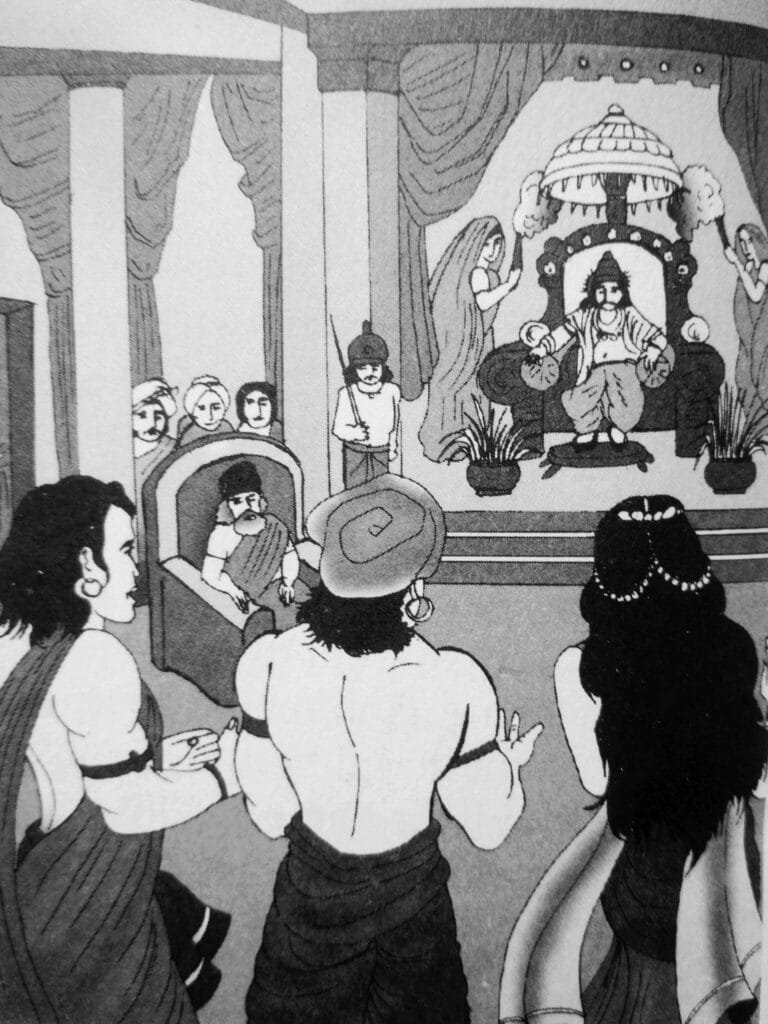
Thus, Princess Vanavan Maha Devi and King Aditya were married, and the three departed for Uraiyur, the Chola capital.
Instead of Uraiyur, they headed toward the Gurukul, where the Pandyan king, Parantaka Vira Narayan, waited impatiently. When the Chera princess Vanavan Maha Devi arrived—accompanied by Acharya Kanada and the Chola king Aditya—the Pandyan king was overjoyed at the sight of her.

But upon hearing the full story, his joy turned to dismay. With a broken heart, he declared, “I cannot marry you,” and walked away.
Betal ended his tale and posed his riddle to King Vikramaditya: “Why did the Pandyan king Parantaka Vira Narayan refuse the Chera princess when his deepest wish had seemingly been fulfilled?”
Dear Readers,
Do you believe King Parantaka Vira Narayan was right to reject the Chera princess, even after Acharya Kanada and the Chola king Aditya went to such lengths to bring her to him? Ponder this carefully—for Vikramaditya’s answer may challenge your convictions.

Vikramaditya replied, “Betal, King Parantaka Vira Narayan was absolutely right. Though they had lived as lovers for many months, he and Princess Vanavan Maha Devi shared no legal or sanctified union. Since time immemorial, we humans have built our societies on rules and traditions, with marriage being chief among them. Societal norms are essential for humanity’s survival, and civilization’s smooth functioning depends on them. When King Parantaka learned that Chola King Aditya had wed the Chera Princess, he acted justly: she was now another man’s wife. So he walked away – not because his heart was cold, but because his honor was strong.”
Betal chuckled, “O Vikramaditya, not just wise – your judgment was perfect! But now I must escape you again, for you’ve broken your silence.”
With a mischievous grin, the spirit vanished into the moonlit sky, his laughter rippling through the forest like wind chimes. Below, the stubborn king clenched his fists and charged after the fading echoes, determined to reclaim his elusive prize once more.
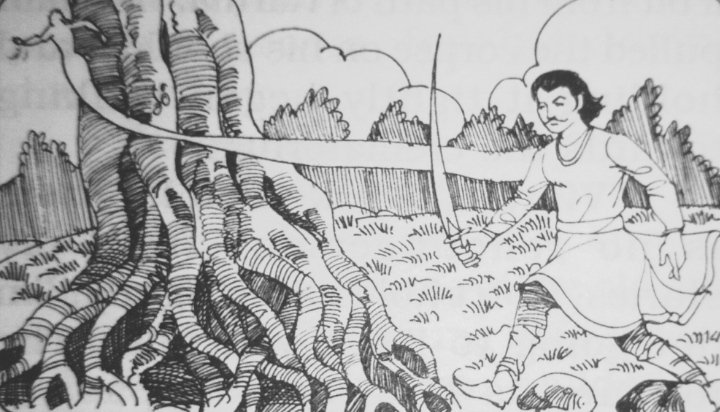
- 14 Best Panchatantra stories in hindi
- 15 Best Children Stories in English from Panchatantra 2.0
- 16 Best Aesop's Fables in Hindi with moral lessons
- 17 Best Aesop's Fables with moral lessons for children
- Arabian Nights
- Author's Best Written Stories in English
- Author's Best Written Stories in Hindi
- Baital Pachisi बैताल पचीसी in Hindi
- Bedtime Stories for All
- Hindi Love Stories
- Love and Romance
- Vikram and Betal series: Riddle Solving Stories
You can join my WhatsApp Channel by clicking the link here
